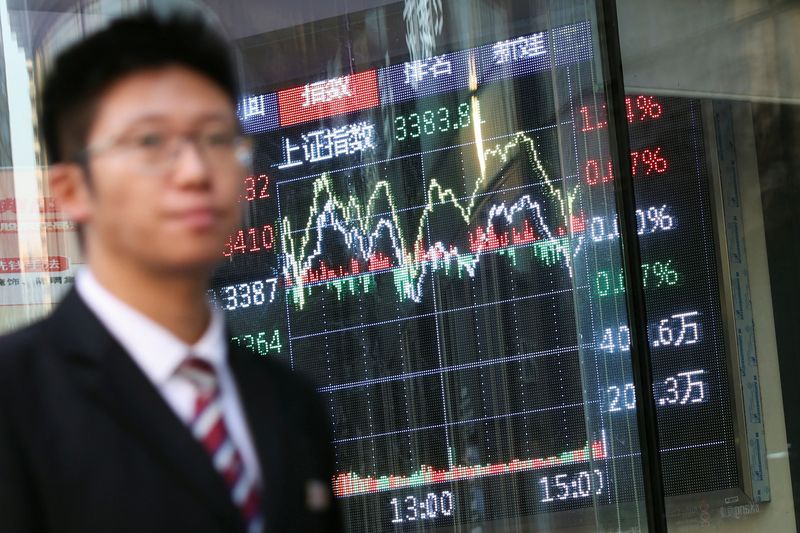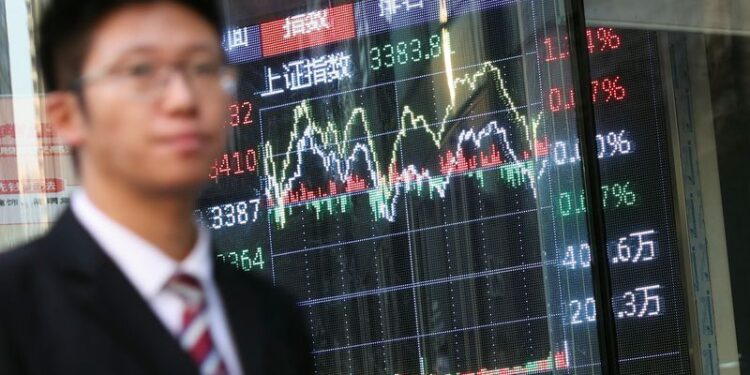By Tom Westbrook
SINGAPORE (Reuters) -China stocks surged and commodities and the Australian dollar found support on Tuesday on Beijing’s new promises of rate cuts and a boost to consumption, while global stocks were wobbly ahead of a crucial U.S. inflation reading.
Australia’s central bank left its cash rate unchanged at 4.35% as expected, though the slid in the aftermath as policymakers toned down their hawkish language.
Overnight the fell 0.6% and futures dipped 0.08% in the late Asia morning.
A 2.5% drop for chip titan Nvidia (NASDAQ:), which edged a fraction lower still in after-hours trade following China opening an antitrust investigation, weighed on the mood.
MSCI’s broadest index of Asia-Pacific shares outside Japan rose 0.1%, led by a 1% gain for the and a 2% rise in the blue chip index. ()
rose 0.15%. ()
A statement from China’s Politburo on Monday had already spurred a late surge in Hong Kong stocks and sent yields on Chinese government bonds to record lows on bets there is help at hand to lift sluggish spending and economic growth.
State media outlet Xinhua reported the top Communist Party officials had shifted the monetary policy stance from “prudent” to “moderately loose,” mirroring their response in previous crises, and would stabilise markets and “vigorously” boost consumption.
“The statement signals potential rate cuts, fiscal expansion and asset buying ahead,” said analysts at ANZ in a note, though with the magnitude unclear and further details possibly coming later in the week from the Central Economic Work Conference.
The rally lifted China’s major indexes to one-month highs with consumer shares notching large gains. The optimism also overshadowed dismal China trade numbers, which showed exports grew at a slower pace in November while imports unexpectedly shrank.
But the runaway rally in Chinese bonds, which extended on Tuesday to drive 10-year and 30-year yields to record lows suggests some investors doubt the pledges are going to lift long-run growth in China.
“In the past demand for credit outstripped supply, making it straightforward for the PBOC to boost credit growth by cutting policy rates,” said Julian Evans-Pritchard, head of China economics at Capital Economics.
“By contrast, there is now limited appetite among households and large parts of the private sector to take on more debt, even at lower rates. That leaves most of the burden of stimulating the economy on fiscal policy.”
WAITING ON CPI
Australian ore miners caught a boost from China’s policy shift, with Fortescue up almost 7% and Rio Tinto (NYSE:) rising more than 5%. ()
The Aussie last traded 0.8% lower at $0.6390. The Reserve Bank of Australia said in its policy statement on Tuesday that the board had gained “some confidence” that inflation was heading back to target. Investors’ focus now turns to a press conference at 0430 GMT for guidance around inflation and the bank’s next policy move.
The U.S. consumer price report is out Wednesday and the core is seen holding at 3.3% for November, which should be no impediment to an easing. Interest rate futures imply an 85% chance of a rate cut next week is priced in by the market.
Traders are also expecting rate cuts in Europe and Canada later this week and are leaning towards a cut in Switzerland as authorities may like to tap the brakes on the franc’s relentless rise against the euro.
The euro traded at $1.0553 and 0.9270 francs. The Japanese yen, which was the best-performing G10 currency in November as expectations have grown for a December rate hike in Japan, was a fraction stronger at 151.18 per dollar.
Positioning data shows speculators flipped to a long yen position last week for the first time in more than a month.

Oil prices rose on Monday on the news of China’s policy plans and as the sudden fall of Syrian President Bashar al-Assad highlighted instability in the Middle East and geopolitical risk. But futures fell 0.44% to $71.82 a barrel on Tuesday.
Gold hovered at $2,669 an ounce while bitcoin fetched $96,039.







